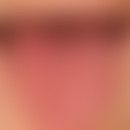Synonym(s)
HistoryThis section has been translated automatically.
DefinitionThis section has been translated automatically.
Chronic, systemic, granulomatous inflammation with the classic symptom triad: Cheilitis granulomatosa, facial paresis, lingua plicata. The full picture of the syndrome is rare, more frequent are differently pronounced minus variants. That of E. Melkersson and C. Rosenthal is now increasingly referred to under the broader term"orofacial granulomatosis" and more generally defined as "recurrent uni- or bilateral orofacial swelling with cranial nerve dysfunction or paresis".
You might also be interested in
Occurrence/EpidemiologyThis section has been translated automatically.
The incidence of Melkersson-Rosenthal syndrome (MRS) in adults is reported to be 1:1250 (Ziem et al. 2000). In children, the full-blown MRS is rare.
EtiopathogenesisThis section has been translated automatically.
Unknown. Discussed are:
- Constitutional anomaly, hereditary or acquired disorder of the autonomic defense system, inflammatory, possibly infectious-allergic reactions to various antigens.
- A familial occurrence is reported in around 30% of patients (Feng et al. 2014/Mansour M et al. 2019). An autosomal dominant inheritance is being discussed. It is possible that the responsible gene is located on chromosome 9p11.
ManifestationThis section has been translated automatically.
The average age at first manifestation is 14.1 years (Feng et al 2014).
ClinicThis section has been translated automatically.
The fully developed syndrome is only observed in a minority of patients in larger collectives. Monosymptomatic and oligosymptomatic cases are the rule (>80%); they are also mainly found as indicative initial manifestations.
Typical is a variable course of symptoms with circumscribed facial swelling, mostly lip swelling (initially recurrent, later persistent, usually unilateral) and facial nerve palsy. The changes are functionally and cosmetically disturbing for the patient, and sometimes painful.
- Circumscribed facial swelling:
- Cheilitis granulomatosa (by far the most common partial manifestation of Melkersson-Rosenthal syndrome).
- Other partial manifestations described include circumscribed swelling of the cheeks, eyelids, forehead, palate, gingiva, tongue(see also macroprosopitis), buttocks and anogenital region (see below granulomatous lymphangitis of the scrotum and penis).
- Facial nerve palsy (in 19.4% of cases): Mostly unilateral, in 25% of cases bilateral, always of the peripheral type.
- Lingua plicata in 54% of cases (normal population 13%). Assignment to the cardinal symptoms has been abandoned in recent years and now only has an indicator function. Note: May occur in co-occurrence with exfoliatio areata linguae.
Associations with monogenic migraine (familial hemiplegic migraine/FHM/Azzarà A et al. 2023) and MRS have been described. Of note is the finding in one affected family, one sister of whom had recurrent facial paralysis with associated symptoms of Melkersson-Rosenthal syndrome. A c.3521C>G missense heterozygous variant in the SCN1A gene was identified. In addition to familial hemiplegic migraine (FHM), variants in the SCN1A gene can cause a whole spectrum of early-onset epileptic encephalopathies. It is possible that the mutation in the SCN1A gene indicates an overlap between MRS and FHM (Azzarà A et al. 2023).
- Minorsymptoms: Due to their frequent and constant occurrence, they play an important role in diagnostics. They are found with decreasing frequency:
- Crohn's disease (6.8%)
- Migraine headaches (5.7% -Hazey MA et al. 2009)
- Paresthesias in the swelling area
- Disorders of tear secretion
- redness
- itching
- Nausea/nausea
- Secretion disorders of the salivary glands or nasal mucosa
- dizziness
- Tingling
- Facial sweating
- Acroparesthesia
- Feeling of heat
- globus sensation in the throat
- acoustic sensations.
- Systemic lupus erythematosus (2.3%)
Differential diagnosisThis section has been translated automatically.
Erysipelas recidivans: Characteristic history with the early erysipelas tetrad (fever, redness, painful swelling, acute lymphadenopathy). Laboratory: signs of inflammation.
Herpes simplex recidivans: Typical interval-like course with signs of evident herpes simplex on the skin.
Furuncle of the upper lip: Acute course with circumscribed dolent swelling. The tip of the abscess is often purulent.
Macrocheilia of other cause: No variable course. Mostly evident underlying diseases such as exfoliative cheilitides etc.
Facial paresis of other cause: not combined with other partial symptoms of Melkersson-Rosenthal syndrome.
TherapyThis section has been translated automatically.
External therapyThis section has been translated automatically.
Internal therapyThis section has been translated automatically.
To date, there are no approved therapies for this disease. Unfortunately, there is a lack of reliable study results due to the rarity of the disease.
- Improvements can be achieved with clofazimine (e.g. Lamprene). Early use in particular improves the chances of success, initially 100 mg/day p.o. for 10 days, then alternating 100 mg 3-4 times/week for 6 months, repeated after a 3-month break if necessary. If unsuccessful, dosage can be doubled.
- Alternative (better therapeutic modality): Fumaric acid ester (e.g. Fumaderm®) in the usual dosage. There are own personal experiences about this therapy approach as well as some published casuistics (G. Hauck 2017). Remark: This therapy has to be planned over a period of >12 months!
- Alternative: Permanent intake of non-steroidal anti-inflammatory drugs like ibuprofen (e.g. Ibuprofen Heumann 400-800 mg/day).
- Alternative: Systemic glucocorticoids are often recommended, but in our experience show only moderate success. Prednisolone (e.g. Decortin H) initially 40-60 mg/day p.o. for 2-4 weeks, followed by slow dose reduction.
- Alternative: Omalizumab (Nettis E et al. 2018).
- Other procedures: Multiple therapeutic modalities with chloroquine, diuretics, DADPS, acetylsalicylic acid, nicotinic acid amide, and others have been described with equivocal success.
Operative therapieThis section has been translated automatically.
Progression/forecastThis section has been translated automatically.
Thrustworthy, chronic, years-long, possibly life-long course. Quoad vitam good, quoad sanationem bad. Spontaneous remission possible.
LiteratureThis section has been translated automatically.
- Azzarà A et al. (2023) Melkersson-Rosenthal Syndrome and Migraine: A New Phenotype Associated with SCN1A Variants? Genes (Basel) 14:1482.
- Elias MK et al. (2013) The Melkersson-Rosenthal syndrome: a retrospective study of biopsied cases. J Neurol 260:138-143
- Feng S et al. (2014) Melkersson-Rosenthal syndrome: a retrospective study of 44 patients. Acta Otolaryngol 134:977-981
- Galdiero MR et al. (2021) Orofacial granulomatosis: Clinical and therapeutic features in an Italian cohort and review of the literature. Allergy 76:2189-2200.
- Hazey MA et al. (2009) Melkersson-Rosenthal Syndrome with migraine-like headaches treated with minocycline: a case report and review of the literature. W V Med J 105:15-17
- Hauck G (2017) Fumaric acid ester therapy for Melkersson-Rosenthal syndrome. Act Dermatol 43: 459-460
- Hornstein OP et al (1987) Classification and clinical variation of Melkersson-Rosenthal syndrome (MRS). Z Hautkr 62: 1453-1475
- Lüscher E (1949) Syndrome of Melkersson-Rosenthal. Schweiz Med Wochenschr 79: 1-3
- Mansour M et al. (2019) Melkersson-Rosenthal syndrome: About a Tunisian family and review of the literature. Clin Neurol Neurosurg185:105457.
- Melkersson E (1928) Ett fall av recidiverande facialispares i samband med angioneurotiskt ödem. Hygiea, Stockholm 90: 737-741
- Miescher G (1956) Cheilitis and pareitis granulomatosa without facial nerve palsy in the presence of a lingua scrotalis. Dermatologica 112: 536
- Neuhofer J, Fritsch P (1984) Cheilitis granulomatosa (Melkersson-Rosenthal syndrome): Treatment with clofazimine. Dermatology 35: 459-463
- Nettis E et al.(2018) A favorable response to omalizumab in a patient with cheilitis granulomatosa. J Allergy Clin Immunol Pract 6:1425-1426.
- Rosenthal C (1931) Clinical hereditary contribution to constitutional pathology. Common occurrence of recurrent familial facial paralysis, angioneurotic facial edema and lingua plicata in arthritic families. Z Gesamte Neurol Psychiat 131: 475-501
- Stosiek N et al. (1991) Melkersson-Rosenthal syndrome - follow-up analysis of 73 patients (1968-1990). Z Hautkr 66: 18-24
- Sussman GL et al. (1992) Melkersson-Rosenthal syndrome: clinical, pathologic, and therapeutic considerations. Ann Allergy 69: 187-194
- Tausch I et al. (1992) Experience with clofazimine therapy of Melkersson-Rosenthal syndrome. Dermatology 43: 194-198
- Shapiro M et al. (2003) Melkersson-Rosenthal syndrome in the periocular area: a review of the literature and case report. Ann Plast Surg 50: 644-648
- van De Scheur MR et al. (2003) Orofacial granulomatosis in a patient with Crohn's disease. J Am Acad Dermatol 49: 952-954
- van der Waal RI et al (2001) Cheilitis granulomatosa. J Eur Acad Dermatol Venereol. 15: 519-523
- Volz A et al. (2010) Surgical lip reduction plasty for therapy-resistant cheilitis granulomatosa. JDDG 8: 303-305
- Ziem PE et al.(2000) Melkersson-Rosenthal syndrome in childhood: a challenge in differential diagnosis and treatment. Br J Dermatol 143: 860-863
- Zimmer WM et al. (1992) Orofacial manifestations of Melkersson-Rosenthal syndrome. A study of 42 patients and review of 220 cases from the literature. Oral Surg Oral Med Oral Pathol 74: 610-619
Incoming links (26)
Ashtray syndrome; Blepharitis granulomatosa; Blepharochalasis syndrome; Cheilitis granulomatosa; Clofazimine; Conidiobolomycosis; Exfoliation areata linguae; Facial edema; Facial swelling, differential diagnosis; Gingival hyperplasia; ... Show allOutgoing links (25)
Acetylsalicylic acid; Antigen; Blepharitis granulomatosa; Boils; Cheilitis granulomatosa; Chloroquine; Clofazimine; Crohn disease, skin alterations; Dadps; Gingivitis granulomatosa; ... Show allDisclaimer
Please ask your physician for a reliable diagnosis. This website is only meant as a reference.























